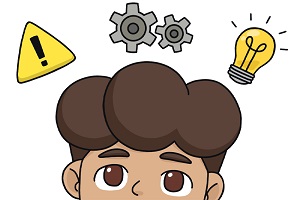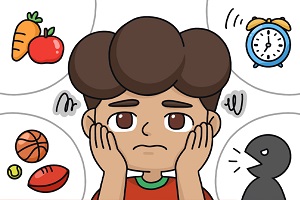What are attention, regulation and concentration skills?
Explore this page to learn about attention, regulation, concentration, and executive functioning. You’ll also find information on how to support your child if they’re experiencing challenges in these areas.
Summary
- Attention and concentration help us focus on an activity and block out distractions.
- Regulation is the ability to understand our emotions and manage our behaviour.
- Talk to your child’s teacher, doctor or other health professionals if you are worried about your child’s attention, regulation and concentration skills.

Attention and Concentration
Paying attention and concentrating mean being able to focus on an activity – and stay focused – while blocking out any distractions.
Being able to focus on an activity helps children to keep trying until they manage to learn or complete a task.
Attention is also important for following a set of instructions, like ‘Put your lunch and hat in your school bag, then put your shoes on’.
Regulation
Self-regulation is the ability to understand our emotions and manage our behaviour.
Sometimes our emotions or the task we need to do can overwhelm us. It takes time – and help from others – to learn self-regulation.
Adults can help children learn to regulate their emotions and behaviour by being with them to help them make sense of their feelings. This is called co-regulation. Children with attention, regulation and concentration difficulties might need more help with co-regulation than other children.
You can help with co-regulation by:
- staying with your child when they are overwhelmed
- helping them name or describe what they are feeling
- sitting quietly with them to show that you care
- giving them helpful ways to cope with how they are feeling, for example moving their body, taking a break, talking or drawing pictures.
Some children like to be hugged. Others may just want to know you are nearby when they are feeling a big emotion.
Difficulties with attention, regulation and concentration
Children who have difficulty with these skills may:
- be easily distracted, especially when doing something they find challenging
- find it tricky to remember what they need to do
- have difficulty with social skills and making friends
- need help to understand their emotions and manage their behaviour
- need more breaks to move their body
- find it hard to shift between tasks, especially when they have to stop doing something they really enjoy
- need help with planning what they need to do, even with regular routines like getting ready for school
- have trouble relaxing and falling asleep.
Remember, it’s normal for all children to have difficulty with attention, concentration and regulation some of the time.
Talk to your child’s teacher, GP or other health professional if you are worried that your child’s attention, regulation and concentration skills are affecting their:
- learning
- health and wellbeing
- relationships with others.
Summary
- Executive function is a set of mental skills. These skills help children pay attention and regulate their behaviour.
- Children develop these skills over time and with your help.
- You can help your child develop their executive function at home and at school.

What is executive function?
Executive function is the brain’s control centre. It is a set of mental skills that includes working memory, impulse control, attention and flexible thinking.
Executive function helps children in their everyday life to do things like:
- manage lots of new information and ignore distractions
- plan what they need to do
- look for mistakes in school work
- make decisions and be flexible if plans change
- manage thoughts and feelings so they can pay attention and regulate their behaviour.
We all can have difficulty with our executive function at times, especially if we’re tired, hungry or stressed.
Difficulties with executive function
You may notice that your child needs more support with these skills than other children.
They might:
- be easily distracted
- find it hard to get organised and plan what they need to do
- find it hard to follow instructions or do everyday tasks, like getting ready for school
- be impulsive and sometimes disrupt others
- have difficulty with social relationships or playing with others
- be easily overwhelmed by what they need to do.
Tips for helping your child develop their executive function
- Give short, easy to understand instructions.
- Break large tasks into smaller steps.
- Have consistent routines at home to help your child plan and carry out their daily activities.
- Use pictures, step-by-step lists or charts to show your child what to do.
- For older children, use a timetable, diary, or digital reminders.
- Take breaks during difficult tasks – some children find it helpful to stop and move around.
- Praise and reward your child for their efforts straight away.
- Play games together that help develop these skills, such as puzzles, building blocks, and card or board games.
It might take a while to figure out what works best for your child.
Remember, your child needs lots of help and praise from you to practise and continue developing their executive function.
Resources
In this video families share what they have noticed impacts their child’s attention, regulation and concentration.
In this video families share the things they wish somebody had shared with them when they first started their journey of parenting a child with attention, regulation and concentration challenges.
Watch this video to learn more about what you can do to support your child’s attention, regulation and concentration skills.
Resources
School Age (5-8 years) | Raising Children Network

